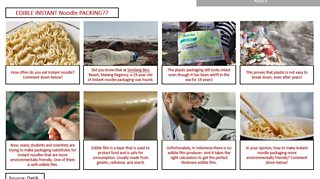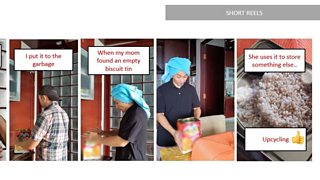Using noodles and Granny's biscuit tin to address climate change in Indonesia
Pravita Kusumaningtias
Project officer, ±«Óãtv Media Action Indonesia
Tagged with:
Indonesia is one of the youngest offices of ±«Óãtv Media Action. One of our projects is focused on green growth and climate change and is aimed at young people. On social media platforms, our brand, (Our Action) is sharing compelling information and insights, reaching millions and sparking conversations amongst our audiences across the Indonesian archipelago through Instagram, Youtube, Tiktok, and Twitter.
We’ve found that the best way to communicate about such issues and how they're affecting each one of us is by using aspects of everyday life that young people can easily relate to.​​​​​​​
Tasty and... forever?
Who doesn’t love instant noodles? Quick, easy, delicious.
In Indonesia, they are very popular, people eat them every day, and the most well-known brand - which is exported widely - is almost part of our national identity.
One of the most successful stories we produced used instant noodles as a hook. The first part of the story showed the problem: people finding a 19-year-old instant noodles plastic packaging on the beach – unchanged, intact. Indestructible.
The second part of the video focused on the solution. It presented environmentally friendly packaging material produced by scientists as an alternative to plastic packaging.
You can see the video .

How we raised the issue of the indestructible instant noodle package
The impact?
So far, the packaging of instant noodles has not changed. But at least we have started the conversation.
The video went viral and reached more than four million people on YouTube alone. Young people are talking about it on social media and the viewership is increasing by the day. Indonesians today are more aware of how their consumption can be detrimental to their environment - including these noodles. ​​​​​​​​​​​​​​
On Twitter, people joked about the good quality of the packaging that is indestructible, but they also discussed the price that we pay for eating plastic-packaged instant noodles. Our research showed that people not only found it relatable but were surprised that something they do every day could have such an impact on the planet.
We never expected the video to go viral. We’re used to videos of celebrities going viral, but not instant noodles. What we learned is something we talk about all the time at the ±«Óãtv, "using something people can relate to". It works.
So we did it again with Grandma’s biscuit tin – another very popular video.
Simplifying communications around upcycling.
Who doesn’t remember their disappointment during their childhood when they would open the biscuit tin only to find that their granny had put cheap crackers in it, or even worse, a sewing kit?
This shared moment of early sorrow helped to create feelings of nostalgia within the viewer, and then, the upside: look… even Grandma was an environmentalist.
In our re-telling of this common story, we had a young person repurposing the tin and upcycling it.
You can watch the video .

How Granny is an environmentalist - by upcycling the biscuit tin
Now that we built a fanbase of more than 181k on social media, I would say we need to take the next step and engage with people outside the social media sphere. We need roadshows and live discussions so we can get young people to take action as a community rather than individuals.
Research is vital to knowing what your audiences will like and making this an entry point to your programme is key to success. In Indonesia, youth are tech-savvy, but they also want to engage online, build their identity, and talk about food, fashion, and music – not just climate change.
--
Find out more about our project Kembali Ke Hutan (Return to the forest) here .
Read our research evaluation briefing about the project .
Kembali Ke Hutan is funded by .
